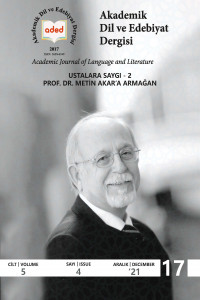The Interpretation of the Nations that Have Been Fought Against and the “Other” in Seventeenth and Eighteenth Century Gazavâtnâmes
Abstract
Gazavatnames, which are the common work of both historical and literary fields, are studies that reveal a different perspective on Ottoman history. Beyond a war and victory narrative, these texts are works that allow different readings and inferences and draw attention with their language and style, vocabulary, world of analogy and sentence structure, as some of them were written by people who participated in the war. In this article, some fetihnames/gazavatnames/zafernames selected from the 17th and 18th centuries will try to be presented with sample texts the nations the Ottoman army fought against and how they were described, in other words, how the “other” was handled. The concept of “other” in the title of the article is used here as the opposite of what is from “us” or the opposite of “us” as “other”. As it is known, in such a discourse, the expression of those who are not one's own or rather “the enemy” will naturally bring a “negative” connotation in almost every text. In this study, it is aimed to present a section about this subject.
Keywords
References
- Adamaz, K. (1998). Fetihnâme-i cezîre-i Sakız (Transkripsiyon-Değerlendirme). [Yayımlanmamış Yüksek Lisans Tezi]. Ege Üniversitesi Sosyal Bilimler Enstitüsü.
- Arslan, M. (2009). Sipâhizâde Ahmed’in gazâvat-nâme-i cezîre-i Girit ve Zadre isimli eseri (değerlendirme-transkripsiyon), [Yayımlanmamış Yüksek Lisans Tezi]. Marmara Üniversitesi Türkiyat Araştırmaları Enstitüsü.
- Ayverdi, İ. (2010). Misalli büyük Türkçe sözlük, Kubbealtı Yayınları.
- https://kuran.diyanet.gov.tr/mushaf [erişim tarihi: 01.06.2019]
- https://yazmalar.gov.tr [erişim tarihi: 01.06.2019]
- İsen, M.-Aksoyak, İ. H. (2018). Vuslatî Ali Bey, Gazanâme-i Çehrin, ekitap.kulturturizmr/Eklenti/58584,vuslati-ali-bey--gaza-name-i-cehrinpdf.pdf?0.gov.tr
- Karahancı, İ. (2016), Sözcük birimlerin üslup oluşumuna katkısı. TEKE, 5(4), 1731-1747.
- Koç, O. (1992). Gazâ-nâme-i Cezzâr Gazî El-Hâcî Ahmed Paşa. [Yayımlanmamış Yüksek Lisans Tezi]. Erciyes Üniversitesi Sosyal Bilimler Üniversitesi.
- Levend, A. S. (2000). Gazavât-nâmeler ve Mihaloğlu Ali Bey’in gazavât-nâmesi. TTK Yayınları.
- Onay, A. T. (2002). Eski Türk edebiyatında mazmunlar. Cemâl Kurnaz (haz.). TDV Yayınları.
- Şahin, K. Ş. (2015). Gazavâtnâmelerde edebî savaş tasvirleri. TÜBAR, XXXVII-Bahar, 235-268.
- Şahin, K. Ş. (2015). Gazavatnâmelerde edebî savaş tasvirleri (15-16. yüzyıl). [Yayımlanmamış Doktora Tezi]. Kırıkkale Üniversitesi Sosyal Bilimler Enstitüsü.
- Temelkuran, T. (2000). Gazavat-ı Cezâyirli Gazi Hasan Paşa (tahlil ve tenkidli metin). [Yayımlanmamış Doktora Tezi]. İstanbul Üniversitesi, Sosyal Bilimler Enstitüsü.
- Tökel, D. A. (2001). Şâirin tarihe düştüğü not: şâir gözüyle Kara Mustafa Paşa ve Çehrin seferi. Uluslararası Merzifonlu Kara Mustafa Sempozyumu (08-11 Haziran 2000). Merzifon Vakfı Yayınları, 371-382.
- Yıldırım, N. (2005). Kara Çelebi-Zâde Abdülaziz Efendi’nin Zafername Adlı Eseri (Tarihçe-i Feth-i Revan ve Bağdad) Tahlil ve Metin. [Yayımlanmamış Yüksek Lisans Tezi]. Mimar Sinan Güzel Sanatlar Üniversitesi Sosyal Bilimler Enstitüsü.
- Yılmaz, M. (2012). Mustafa Zühdî, Ravzatü’l-gazâ (târîh-i Uyvar) (1663-1665) tahlil ve metin. [Yayımlanmamış Yüksek Lisans Tezi]. Mimar Sinan Güzel Sanatlar Üniversitesi Sosyal Bilimler Enstitüsü.
Abstract
Hem tarihî hem de edebî sahanın ortak ürünü olan gazavâtnâmeler, Osmanlı tarihine farklı bir bakışı ortaya koyan çalışmalardır. Bu metinler, bir savaş ve zafer anlatısının ötesinde farklı okumalara, farklı çıkarımlara imkân sağlayan, bir kısmı bizzat savaşa katılanlar tarafından kaleme alınmasından dolayı dil ve üslûbu, kelime kadrosu, benzetme dünyası ve cümle yapısıyla da dikkat çeken eserlerdir. Bu makalede, XVII. ve XVIII. yüzyıllardan seçilen bazı fetihnâmelerde/ gazavâtnâmelerde/ zafernâmelerde Osmanlı ordusunun savaştığı milletler ve onların nasıl anlatıldığı, bir başka deyişle “öteki”nin nasıl işlendiği örnek metinlerle gösterilmeye gayret edilecektir. Makalenin başlığında yer alan “öteki” kavramı burada bizden olanın karşıtı yani “biz” den olmayan ya da “biz” in tezadı “diğer” olarak kullanılmıştır. Bilindiği üzere bu tarz bir söylemde kendinden olmayan veya daha doğrusu “düşman” olanların anlatımı hemen her metinde “olumsuz” bir çağrışımı da doğal olarak beraberinde getirecektir. Çalışmada bu husus hakkında bir kesit sunulması amaçlanmıştır.
Keywords
References
- Adamaz, K. (1998). Fetihnâme-i cezîre-i Sakız (Transkripsiyon-Değerlendirme). [Yayımlanmamış Yüksek Lisans Tezi]. Ege Üniversitesi Sosyal Bilimler Enstitüsü.
- Arslan, M. (2009). Sipâhizâde Ahmed’in gazâvat-nâme-i cezîre-i Girit ve Zadre isimli eseri (değerlendirme-transkripsiyon), [Yayımlanmamış Yüksek Lisans Tezi]. Marmara Üniversitesi Türkiyat Araştırmaları Enstitüsü.
- Ayverdi, İ. (2010). Misalli büyük Türkçe sözlük, Kubbealtı Yayınları.
- https://kuran.diyanet.gov.tr/mushaf [erişim tarihi: 01.06.2019]
- https://yazmalar.gov.tr [erişim tarihi: 01.06.2019]
- İsen, M.-Aksoyak, İ. H. (2018). Vuslatî Ali Bey, Gazanâme-i Çehrin, ekitap.kulturturizmr/Eklenti/58584,vuslati-ali-bey--gaza-name-i-cehrinpdf.pdf?0.gov.tr
- Karahancı, İ. (2016), Sözcük birimlerin üslup oluşumuna katkısı. TEKE, 5(4), 1731-1747.
- Koç, O. (1992). Gazâ-nâme-i Cezzâr Gazî El-Hâcî Ahmed Paşa. [Yayımlanmamış Yüksek Lisans Tezi]. Erciyes Üniversitesi Sosyal Bilimler Üniversitesi.
- Levend, A. S. (2000). Gazavât-nâmeler ve Mihaloğlu Ali Bey’in gazavât-nâmesi. TTK Yayınları.
- Onay, A. T. (2002). Eski Türk edebiyatında mazmunlar. Cemâl Kurnaz (haz.). TDV Yayınları.
- Şahin, K. Ş. (2015). Gazavâtnâmelerde edebî savaş tasvirleri. TÜBAR, XXXVII-Bahar, 235-268.
- Şahin, K. Ş. (2015). Gazavatnâmelerde edebî savaş tasvirleri (15-16. yüzyıl). [Yayımlanmamış Doktora Tezi]. Kırıkkale Üniversitesi Sosyal Bilimler Enstitüsü.
- Temelkuran, T. (2000). Gazavat-ı Cezâyirli Gazi Hasan Paşa (tahlil ve tenkidli metin). [Yayımlanmamış Doktora Tezi]. İstanbul Üniversitesi, Sosyal Bilimler Enstitüsü.
- Tökel, D. A. (2001). Şâirin tarihe düştüğü not: şâir gözüyle Kara Mustafa Paşa ve Çehrin seferi. Uluslararası Merzifonlu Kara Mustafa Sempozyumu (08-11 Haziran 2000). Merzifon Vakfı Yayınları, 371-382.
- Yıldırım, N. (2005). Kara Çelebi-Zâde Abdülaziz Efendi’nin Zafername Adlı Eseri (Tarihçe-i Feth-i Revan ve Bağdad) Tahlil ve Metin. [Yayımlanmamış Yüksek Lisans Tezi]. Mimar Sinan Güzel Sanatlar Üniversitesi Sosyal Bilimler Enstitüsü.
- Yılmaz, M. (2012). Mustafa Zühdî, Ravzatü’l-gazâ (târîh-i Uyvar) (1663-1665) tahlil ve metin. [Yayımlanmamış Yüksek Lisans Tezi]. Mimar Sinan Güzel Sanatlar Üniversitesi Sosyal Bilimler Enstitüsü.
Details
| Primary Language | Turkish |
|---|---|
| Subjects | Literary Studies |
| Journal Section | Articles |
| Authors | |
| Publication Date | December 30, 2021 |
| Submission Date | November 8, 2021 |
| Acceptance Date | November 23, 2021 |
| Published in Issue | Year 2021 Volume: 5 Issue: 4 |
This work is licensed under Attribution-NonCommercial 4.0 International


